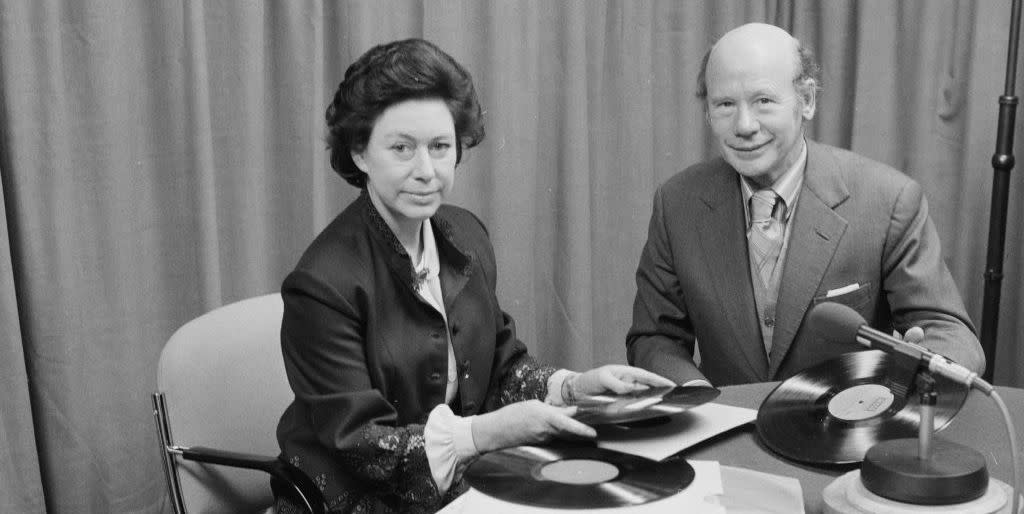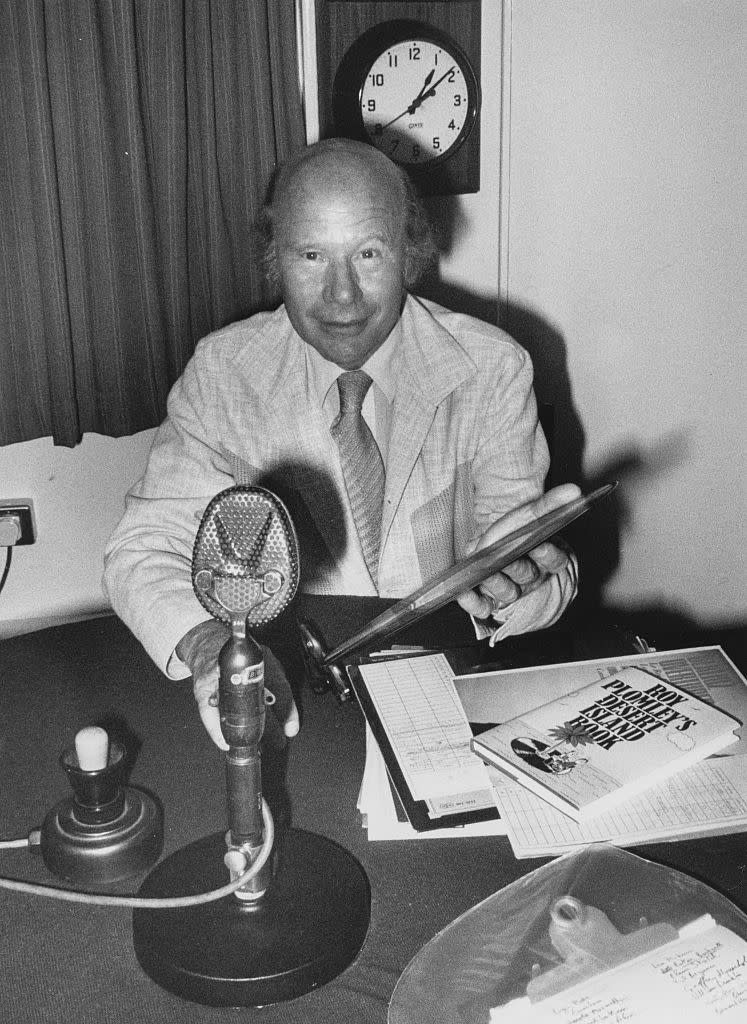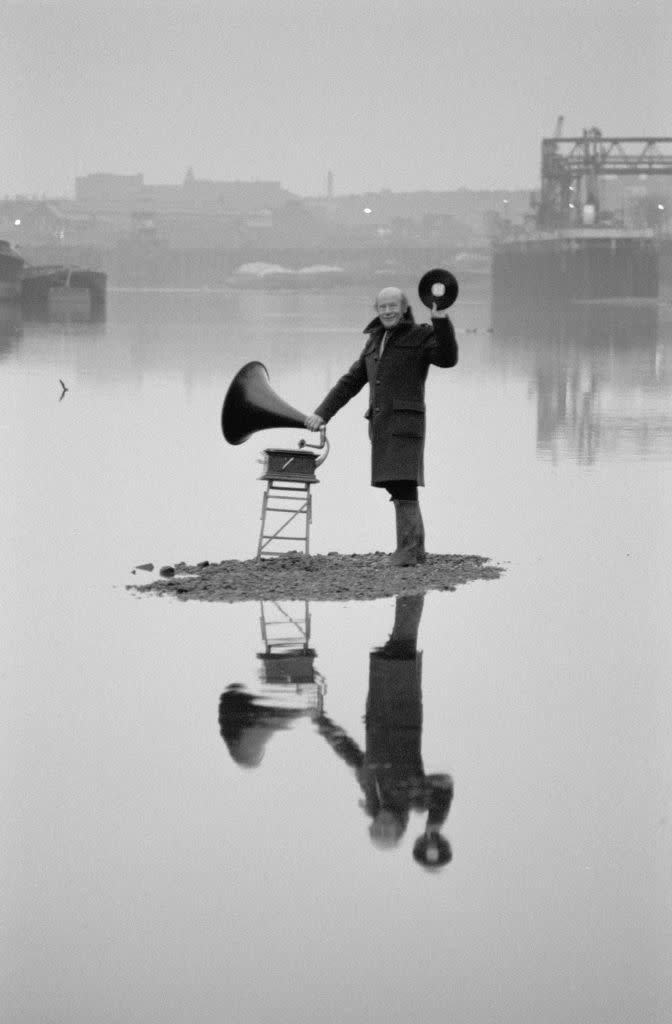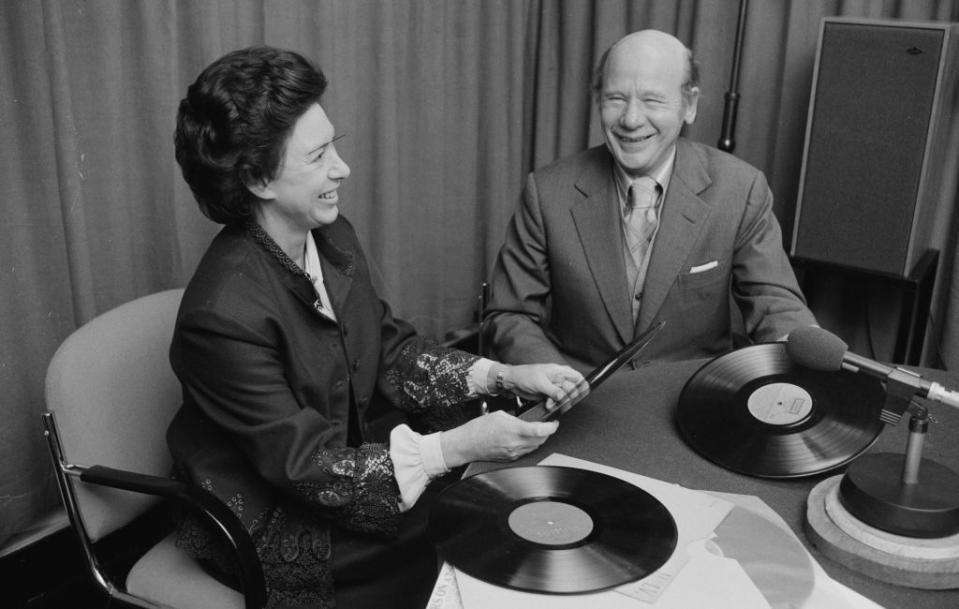How Desert Island Discs Became the Most Important Radio Show in British History

- Oops!Something went wrong.Please try again later.
"Hearst Magazines and Yahoo may earn commission or revenue on some items through the links below."
The year 1941 was one of the darkest in London’s history. Beginning the previous September, Adolf Hitler’s German army had launched a relentless bombing campaign focused primarily on England’s capital, which had claimed thousands of lives, torn families apart, and left swathes of the city in ruins. Despite the British public's' "keep calm and carry on" fortitude during the war, the collective trauma was immense, and escapism was hard to come by amidst blackouts, air raids and rationing.
On a bitterly cold evening that November, a young freelance journalist named Roy Plomley was sitting by the fireplace in his pajamas, watching the last embers die out. Blackout restrictions meant that once the fire went out, his flat would be plunged into total darkness. As he stood up and began making his way to bed, he began idly fantasizing about life on a desert island. It wouldn’t be so bad, he thought, if he could take a few records with him. And then, all at once, the idea for a radio series came to him fully-formed.
Plomley wrote to the BBC that very night, pitching the initial concept for what would become Desert Island Discs. Just two months later, on January 27, 1942, he was recording the first episode in the bomb-ravaged Maida Vale Studios in west London. Surrounded by the scars of a conflict that was still raging overseas, Plomley sat down opposite the Viennese comedian and actor Vic Oliver, to discuss the eight pieces of music he’d take with him to a desert island. At the time, the BBC had agreed to a run of eight episodes. Nobody dreamed that eight decades later, the show would still be going strong.

Today, Desert Island Discs is the UK’s longest-running radio show of all time, and celebrated its 80th anniversary back in January of this year—but when it first began, it aired on the BBC Forces Programme, a wartime station designed to keep up the spirits of troops stationed in France. The concept was alluringly simple: in each episode, a celebrity “castaway” would share with Plomley which eight records they’d choose to have with them if they were alone on an island. To avoid any possibility of confusion, the official synopsis noted that in this hypothetical scenario they would have both “a gramophone and an inexhaustible supply of needles.”

The morale-boosting potential of entertainment put the BBC under intense scrutiny during the war—keeping up spirits was seen as the broadcaster’s duty. As Sean Magee writes in his 2012 book Desert Island Discs: 70 Years of Castaways, “there was particular concern about the quality of the fare being put out for troops,” and two years on from the BBC Forces Programme’s launch in January of 1940, it was widely seen as being in need of new material. Desert Island Discs came along at just the right time.
Leaning into the escapist fantasy at the core of the show, Plomley wanted each episode to open and close with the sounds of “surf breaking on a shore, and the cries of sea birds.” But Leslie Prowne, then the BBC’s head of popular record programs, insisted that the show needed a defining music cue for its opening. In the end, the two ideas were combined, and the first broadcast opened with the sounds of herring gulls overlaying a high orchestral piece called “By the Sleepy Lagoon.” That introductory theme has endured through more than 3000 episodes, with interviewees including politicians, actors, musicians, writers, and even the occasional royal. Plomley hosted for more than forty years; upon his retirement, Sue Lawley became the first female presenter in 1988, and has been succeeded only by women since.
Unfortunately, no audio has survived from the first decade of Desert Island Discs, so it’s impossible to know how closely those early episodes (which were scripted to comply with wartime censorship rules) resemble what the show is today. But the format has never changed, save for a few tweaks—beginning in the 1950s, castaways were allowed to also choose one book and one luxury item to take with them to the island. In a show that feels largely timeless, the latter is often heavily linked to the historical moment—the very first interviewee to pick a luxury item was actress Sally Ann Howes, who (in a nod to the pain of rationing) chose garlic. Two decades later, comedian John Cleese chose “a life-sized model of Margaret Thatcher and a baseball bat” as his luxury.
And then there’s the music. What seems on its surface like an innocuous ice-breaker, the kind of question you might ask at a dinner party, tends to prompt an extraordinarily revealing glimpse at a person’s inner life. As Plomley said in a 1972 interview with The Guardian, asking people to choose their eight most essential pieces of music “gives the same sort of insight as going into a person’s house and looking at his books and pictures.” This is true even for the most guarded and private of interviewees—like, for instance, Princess Margaret, whose interview on Desert Island Discs is the catalyst for an intensely emotional episode of The Crown’s latest season.

Despite her famously prickly demeanor and her conflicted relationship with the press, even Margaret (Lesley Manville) can’t help but be drawn into nostalgia as she shares her musical picks with Plomley—and (at least on the Netflix series) neither can her first love, Peter Townsend (Timothy Dalton), who’s inspired to reunite with the princess after hearing her episode. “The Desert Island Discs recording studio is a surprisingly intimate venue, and it is very easy to hear the sound of sincerely felt emotion on air,” Magee writes, in a passage that could easily have inspired The Crown’s writers as they conceived this storyline. “Sometimes the music acts as a time-shift, bringing an event from years ago right to the front of the castaway's memory. On other occasions, this is simply the first time that a guest has been asked to think deeply about his or her past.”
Most people know how it feels to be suddenly transported back into the past by hearing a particular piece of music—and there’s science to back up that “time-shift” effect. Researchers have discovered that music is a uniquely powerful trigger for memory retrieval, because of the way it’s processed in a region of the brain called the medial prefrontal cortex. “What seems to happen is that a piece of familiar music serves as a soundtrack for a mental movie that starts playing in our head,” explained Petr Janata, a cognitive neuroscientist at University of California, Davis, who’s studied the phenomenon of music-evoked autobiographical memories. “It calls back memories of a particular person or place, and you might all of a sudden see that person’s face in your mind’s eye. Now we can see the association between those two things—the music and the memories.” This helps to explain why the conversations on Desert Island Discs feel so much more intimate and searching than the average radio interview, even in the absence of any particularly prying questions.
Still, the castaways’ picks are curated in the knowledge that they’ll be judged by thousands of listeners, and you have to imagine there’s some pressure to make appropriately highbrow choices. For most of the show’s run, classical music has dominated the selections, with Beethoven and Mozart battling it out as guests’ top pick—but in 2016, The Beatles overtook both, perhaps heralding a new era of pop dominance on the BBC’s hypothetical desert island.
Though the musical selections change with the decades, Desert Island Discs still feels charmingly like a time capsule, in part because the premise is so grounded in physical media that’s all but obsolete. Sixteen years after the birth of Spotify, most of us now take for granted that every piece of music ever created is at our fingertips. And perhaps that’s why the show remains so popular to this day—the artificial limitations it creates are oddly soothing. In a time of limitless on-demand options, being forced to make choices feels all the more valuable.
Listen to Desert Island Discs at the BBC Archive
You Might Also Like

